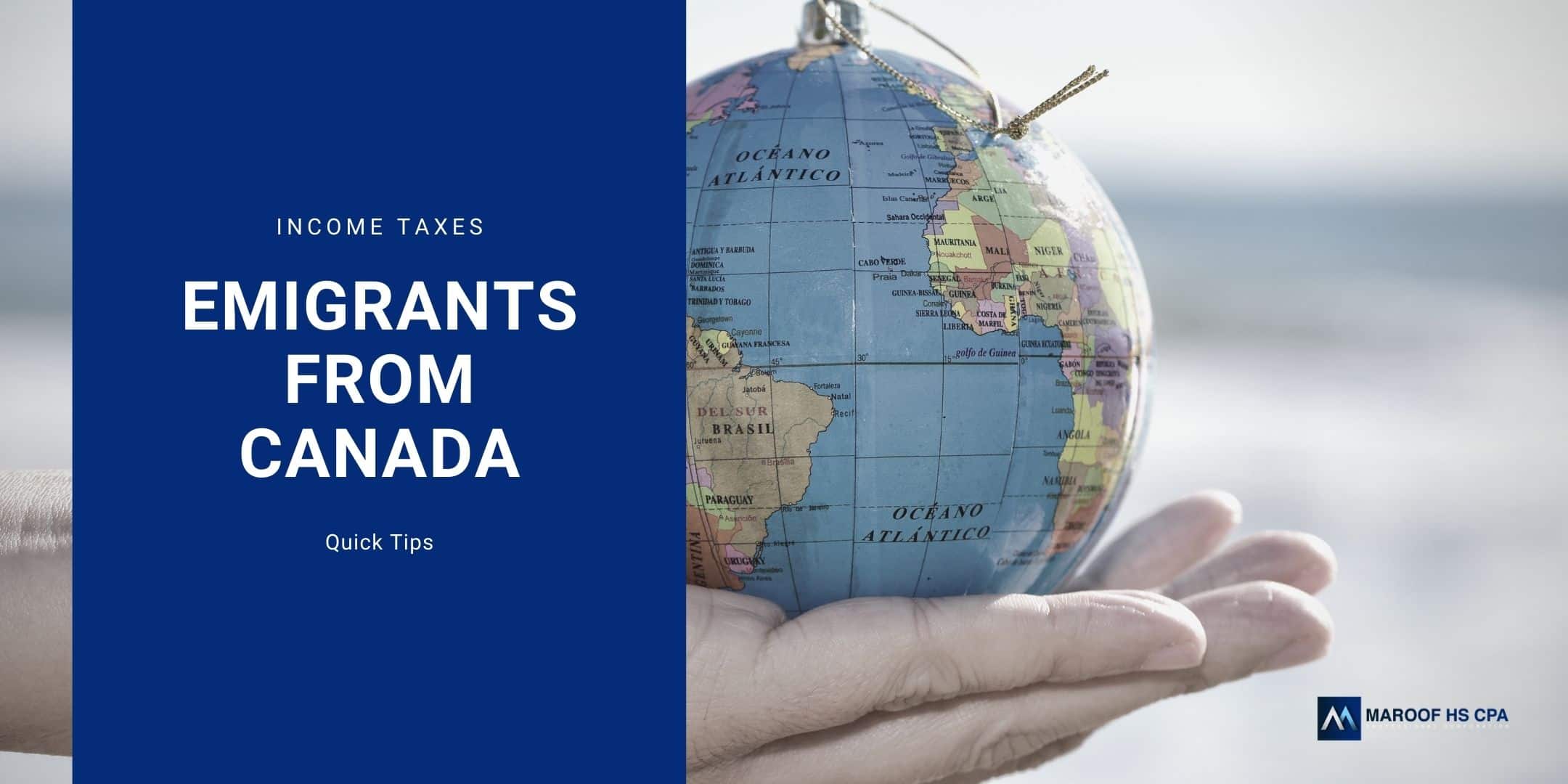If you have been a resident of Canada and decide to leave Canada, you must review your assets, income, and income tax obligations. Leaving Canada is often referred to as “Emigration”.
The year in which an individual leaves Canada and changes his residency status to Non-Resident is split into two parts: one is part of the year when he was a resident of Canada and another one is when he is considered non-resident for tax purposes in Canada. Such an individual is often referred to as a part-year resident.
Often an individual who leaves Canada faces the question of determining one’s residency status for income tax purposes and associated income tax issues. This is important to keep in mind always that income tax residency status is not the same as immigration residency status. A very common issue for leavers which causes income tax complications is unintentionally failing to sever the residential ties with Canada and they are not aware of the fact that their actions and circumstances actually make them factual residents of Canada instead of getting a non-resident status. Departure tax, withholding tax issues, foreign tax credits, and tax treaties between Canada and their new host country are some of the other issues.
Change of residency status affects both the current and future personal taxes of an individual in Canada. In this post, we are going to look at different tax tips from a general perspective. Residency determination for income tax purposes in Canada depends on specific facts of an individual’s circumstances. You are always recommended to consult a professional tax consultant familiar with Non-Resident tax matters.
If you are moving from Canada to the U.S., please click here for a more detailed post.
Determine your date of change of residency status in Canada
Determine the date of change of residency status in Canada. This will be the date when you become a Non-Resident of Canada and serves as an important cut-off point to split the year into resident and non-resident status. This is also known as the Date of departure from Canada and is mentioned on the personal income tax return.
- An individual will be taxed on worldwide income for the year before the date of change of residency status in Canada.
- An individual will be taxed on Canadian-sourced income for the period after the date of change of residency status to Non-Resident in Canada.
- An individual may have to pay a departure tax in Canada depending on one’s circumstances and tax situation
This is important to mention here that residency status determination in Canada is very subjective. At the same time, this is also not a choice of the taxpayer. If you fail to severe the residential ties, you are a factual resident of Canada. In practice, a lot of taxpayers become factual residents of Canada and based their whole tax planning around this premise. These factual residents are deemed nonresidents of Canada if they establish residential ties with a treaty country. Hence, the date of emigration becomes more relevant.
A typical example is someone moving to the U.S. from Canada and spending two or three years there. While doing so she keeps on filing U.S. taxes as a resident alien and Canadian taxes as a resident. In such a case, the date when the taxpayer became a U.S. tax resident is the date of emigration for Canadian tax purposes. This is the date when her resident or factual resident status in Canada changes to deemed non-resident or non-resident.
Departure Tax in Canada
Departure tax is a Capital Gain on the deemed disposition of certain types of property. Deemed disposition is a concept where it is assumed that on the date of departure property subject to departure tax is sold at fair market value and reacquired immediately after that. Not all the property is subject to deemed disposition and there are exceptions.
Read: A detailed overview of departure tax at emigration
Departure tax is an important area of income tax applicable to emigrants or leavers from Canada and professional tax advice is recommended due to the specific situation of each taxpayer. Often leavers from Canada mistakenly consider the assets for departure tax purposes which are clear exceptions; especially real property, capital property, and inventory owned by a business that has a permanent establishment in Canada, TFSAs, RRSPs, Life insurance policies, or the special cases of short-term residents.
Employment Income
It is important to determine which income is Canadian-sourced and which is foreign-sourced. An individual may generate a Canadian income even after the date of departure. An individual must separate the element of income which is earned at the time when an individual was a resident and the time when the individual was not a resident. An individual should also consider the tax laws and Canada’s treaty with the new host country.
Stock Options in relation to Canadian Employment and Canadian Income tax effects for emigrants or leavers
The exercise of stock options in relation to Canadian employment is a complex issue faced by the leavers from Canada. A Non-Resident (leaver) who exercises a stock option must file a Personal income tax return (T1) in Canada for the year in which the stock option is exercised and report the resulting security option benefit.
Principal Residence Exemption
If you own a principal residence in Canada, the principal residence exemption does not travel with you. You must file an appropriate change of use if you are converting your principal residence to income-producing property. Keep in mind that principal residence exemption is not extended to non-residents of Canada and there are rules in place to avoid the abuse.
Read more about Principal residence exemption for non-residents of Canada here.
Taxation of Rental Income from the Canadian Real Property by leavers (emigrants) from Canada
Canada’s tax treaties with other countries generally give Canada the right to tax the rental income of non-residents. If you are a leaver or a non-resident generating rental income from real property in Canada, you should pay very close attention to this.
Rental income from real property such as your house or apartment is subject to 25% Canadian withholding tax on your Gross rental income. Gross rental income means the rental income without any deduction of expenses in generating this income. When you leave Canada, inform your payer of the rental income about the change of status who will withhold 25% tax on the payments.
This is not always the desired tax outcome! There is a better alternative to getting taxed at 25% on gross rental income – elect to file a personal income tax return and report rental income on it. You will be taxed at net rental income at marginal tax rates. Read here.
Bank and Investment Accounts after you leave Canada
You should notify your banks and brokers who are maintaining your bank or investment accounts so that they can start withholding taxes on the payments. You do not have to necessarily close your bank or investment accounts when you leave Canada, however, not informing your payer may make you a factual resident of Canada, so pay close attention to this.
RRSP Contributions for leavers from Canada
Utilize your RRSP Contribution limit for the year in which you depart Canada. Inform your bank or any other financial institution which manages your RRSP accounts that your tax residency status has been changed. You can leave your RRSP account as it is. You should check tax laws in your host country since RRSP may have a complication for your personal taxes there.
Homebuyers’ plan or Lifelong learning loans should be paid back within 60 days of the date of departure, otherwise, these may become income in the year of departure.
TFSA Accounts for leavers from Canada
When you leave Canada, you can make contributions to TFSA before the date of departure. Your savings can still keep on growing tax-free in your TFSAs. You cannot make any contribution or accrue any room after you become a Non-Resident of Canada. You should check the laws of the new host country when you withdraw from your savings account.
RESP Contributions for leavers from Canada
If you have a beneficiary who is a resident in Canada, you can make RESP contributions. You can make these contributions only until the beneficiary leaves Canada.
If you have shares of a small corporation in Canada
When you become a non-resident of Canada, your corporation may lose its CCPC status if it was controlled by you. The effects of emigration on your Canadian-Controlled-Private-Corporation (CCPC) can be found here. Further, you will also lose the ability to claim ABIL and Lifetime Capital Gain Exemption.
If you are a Canadian resident leaving Canada, you are recommended to consult a professional tax accountant or lawyer to discuss your specific tax situation. Maroof HS CPA Professional Corporation provides personal tax services in Canada for both residents and non-residents.





